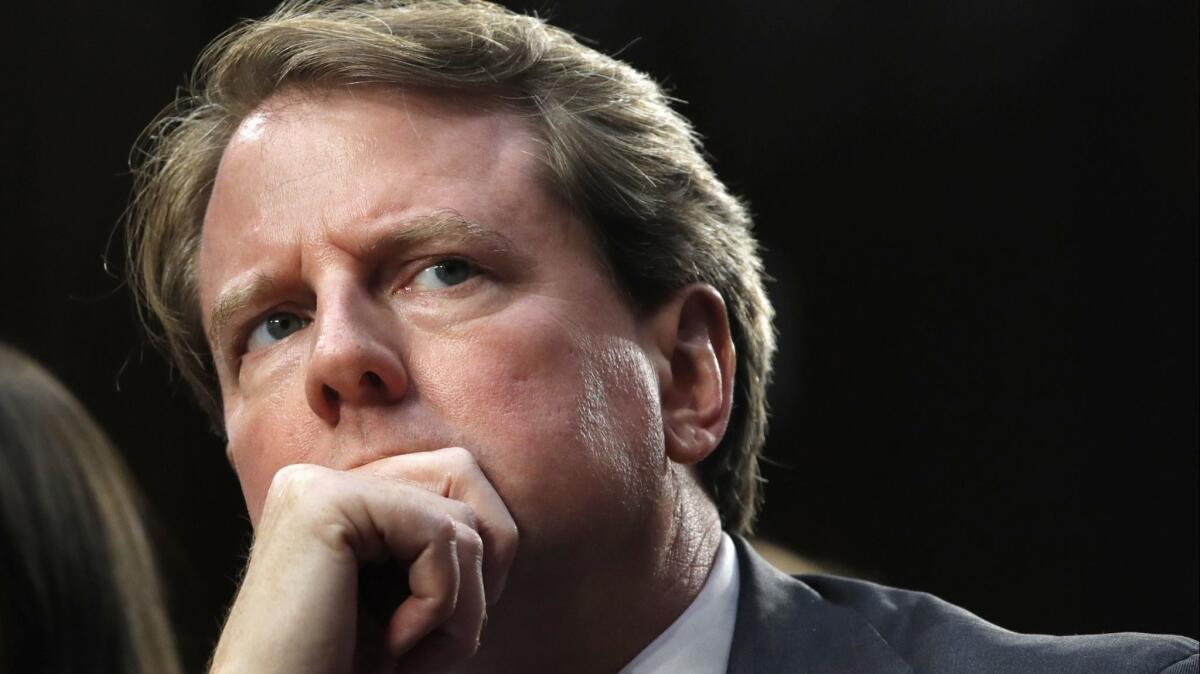Trump, Don McGahn and DOJ stonewalled Congress. Look for the courts to set them right

- Share via
Remember Don McGahn, President Trump’s long-ago White House counsel? Well, he’s back, and more important than ever.
In truth, McGahn never left. He is the defendant in House Judiciary Committee vs. Don McGahn, a lawsuit that has been making its way through the legal system since August. On Tuesday, the lawsuit was under consideration by the full, or “en banc,” D.C. Circuit Court of Appeals. That court’s decision, which likely will come in a month or so, carries enormous stakes. Put simply, the judges will determine whether a congressional subpoena can be enforced by the courts, and more generally, whether Congress can provide even the most basic check on presidential lawlessness.
The case is left over from House hearings on the Mueller investigation and on the impeachment of the president. After special counsel Robert S. Mueller III’s report made it clear that McGahn possessed evidence — documents and testimony — that strongly suggested the president had obstructed justice, the administration pulled out every legal stop to try to prevent the House from getting its eyes or hands on the damning goods, even before the impeachment inquiry began.
When Congress issued McGahn a subpoena in April 2019, the administration countered with an argument — august sounding but legally fanciful — that his tenure at the White House conferred on him something called “absolute testimonial immunity,” protecting him (and other executive branch former and current employees) from so much as showing up to answer questions. Team Trump cynically and successfully calculated that a court battle to settle the subpoena dispute would take so long, McGahn’s testimony would play no role in the impeachment hearings.
In our “Dispatches From the Pandemic” series, we bring you personal stories from people whose lives have been altered by COVID-19.
Recall just the highlights of the testimony and documentary evidence McGahn could have provided. According to the Mueller report, Trump instructed McGahn to stop then-Atty. Gen. Jeff Sessions from recusing himself in the Department of Justice’s Russia inquiries; he directed McGahn to pressure the DOJ about Mueller’s alleged conflicts of interest; he called McGahn at home and ordered him to get Mueller removed (McGahn declined); he also told McGahn directly to lie about that very instruction and create a false record.
A direct, public account of such conduct would forever mar Trump’s legacy. It would suffice to convict a federal defendant any day of the week of obstruction of justice under 18 USC 1505 — “endeavor[ing] to impede the due and proper administration” of a federal investigation. Instead, the president was able to skate by without Congress’ being able to consider, or the American people to know, the details of McGahn’s evidence.
As important as McGahn’s testimony and documents would be to history, and as important as it might have been to making the case for impeachment, the legal principle now at the heart of the court case matters even more.
House Judiciary Committee vs. McGahn started out in U.S. District Court, where Judge Ketanji Brown Jackson held for Congress, saying, “Presidents are not kings.” Her decision was immediately appealed to the D.C. Circuit Court of Appeals, where a three-judge panel reversed Jackson in splintered fashion, 2-1, with three separate opinions including a dissent. The full circuit court then agreed to Congress’ request that it weigh in — a relatively rare event — setting up Tuesday’s showdown.
The three-judge panel had held that federal courts lack authority to resolve an “interbranch information dispute.” That decision left Congress with undisputed power to issue subpoenas but no power to enforce them. The panel’s blithe answer to this obvious imbalance was that the legislators could still work their will through such pale remedies as a “pretty please” request for executive branch cooperation or such extreme and undesirable ones as shutting down the government by making use of the House power of the purse and cutting off all appropriations.
It amounted to a bizarre and pernicious ruling. The authority to enforce subpoenas is a well-accepted judicial function. And were the decision to stand, it would convert a supposedly co-equal branch of government to a paper tiger that presidents could ignore with impunity, as the current one too often has.
On Tuesday during arguments in front of the nine-judge D.C. Circuit, it sounded as if a majority saw the issues in just that light. The administration’s DOJ lawyer was on the defensive early and often. As one judge asked, “How is Congress to conduct its constitutional duty of oversight in the face of the type of utter disregard this administration has shown for that oversight?”
Look for the D.C Circuit to overturn its three-judge panel and find that Congress can subpoena the executive branch, and that the courts can enforce those orders. Although that decision could be appealed yet again, to the Supreme Court, its near-term upshot could well be that the House of Representatives will convene new hearings starring McGahn, just as Trump’s reelection campaign heats up.
After the president’s efforts to exploit his former counsel for lawless ends, it would only be fitting that McGahn’s name would come to stand in the law books for the restoration of the constitutional balance of power and the rule of law.
Harry Litman is a former U.S. attorney and host of the podcast “Talking Feds.” @harrylitman
More to Read
A cure for the common opinion
Get thought-provoking perspectives with our weekly newsletter.
You may occasionally receive promotional content from the Los Angeles Times.










